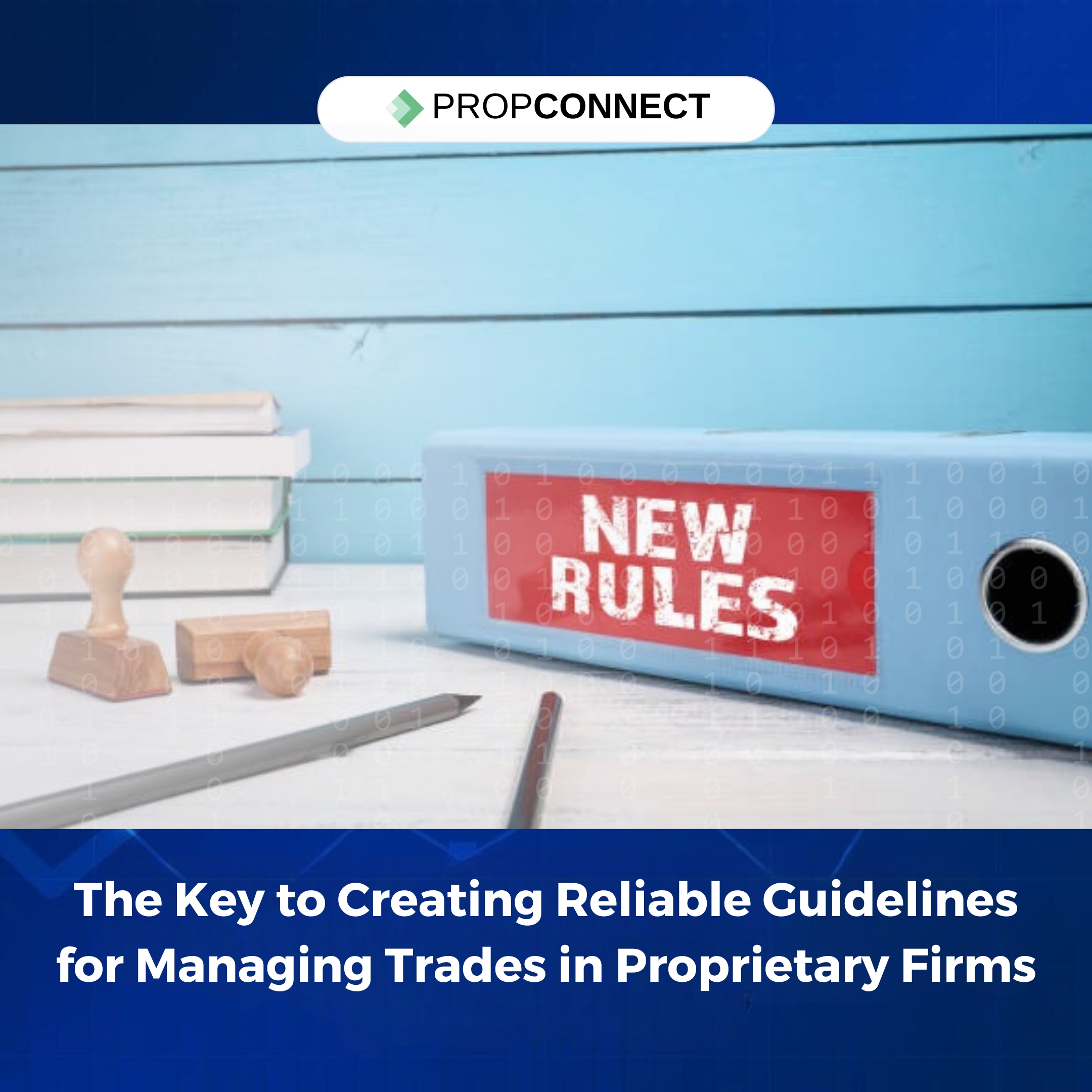Articles
The Key to Creating Reliable Guidelines for Managing Trades in Proprietary Firms
Prop traders need to be flexible and adaptable in order to deal with the ever-changing dynamics and conditions of the market. In reaction to changing market conditions and new possibilities, traders should be prepared to modify their trading management policies, plans, and procedures.

Dealing with a proprietary company gives traders exceptional chances to take advantage of resources, knowledge, and controlled conditions in order to succeed in the financial markets. The creation of efficient trading management rules, which act as instructions for making decisions, controlling risk, and executing trades, is essential to this effort. In order to maximize trading performance and attain long-term profitability, we'll examine in this article how traders working for private firms might implement trading management guidelines.
Reviewing Objectives and Risk Tolerance
Define Risk Tolerance: Traders need to evaluate how much risk they are willing to take on, taking into account things like capital size, experience level, and psychological structure. Determining one's risk tolerance aids in setting limits on the size of positions, the use of leverage, and the total amount of risk exposed when trading.
Create Clear Trading Objectives: It is important for traders to specify their time horizons, performance indicators, and profit targets. Setting clear goals gives trading activities direction and concentration, whether the goals are aggressive growth, capital preservation, or steady returns.
Setting Guidelines for Risk Management and Position Sizing
Position Sizing Methodology: It's important for prop traders to use a position sizing strategy that fits their trading goals and risk tolerance. Methods including volatility-based size, percentage risk per transaction, and set fractional position sizing aid in maintaining consistency and caution while distributing capital throughout trades.
Stop-Loss Order Implementation: Stop-loss orders are essential for controlling downside risk and safeguarding trading capital. To reduce possible losses and maintain capital integrity, traders should set predefined exit targets based on technical levels, volatility indicators, or unfavorable price moves.
Diversification Strategy: Prop traders should diversify their trading portfolio over many asset classes, instruments, and methods in order to lower the risk of their entire portfolio and minimize single-point failures. By spreading out risk exposure, diversification strengthens the trading plan's resistance to unfavorable market circumstances.
Determining Entry and Exit Requirements
Entry Signals: Using technical indicators, chart patterns, and fundamental analysis, traders should establish precise entry criteria that align with their trading approach. Determining objective entry signals guarantees consistency with the trading plan and helps steer clear of rash trading decisions.
Exit strategy: To properly manage positions, prop traders need to lay out an exit strategy for both winning and losing trades. Having predetermined exit criteria aids in capturing profits, limiting losses, and upholding discipline in trade execution—whether through the use of profit goals, trailing stops, or time-based exits.
Trading Journal and Performance Analysis Implementation
Maintaining Trading journal: To keep track of trade entries, exits, justifications, and results, traders should keep an extensive trading journal. Updating the trading log on a regular basis offers insightful information on trading patterns, performance trends, and opportunities for development.
Performance Analysis: To assess the efficacy of their trading management policies and tactics, prop traders should carry out regular performance analyses. Key performance indicators, including win rate, risk-adjusted returns, and drawdowns, can be analyzed to find areas for improvement as well as strengths and shortcomings.
Following Strict Rules and Guidelines
Regulation and Compliance: Traders operating within proprietary firms have to abide by firm regulations controlling trading activity as well as regulatory requirements and compliance standards. Adhering to legal and ethical standards ensures transparency, integrity, and dependability in trading operations.
Risk Limits and Mandates: Proprietary businesses generally enforce trading mandates, leverage limitations, and risk limits in order to maintain regulatory compliance and sensible risk management. To be in line with the goals and risk tolerance of the company, traders must adhere to firm-specific policies and procedures.
Ongoing Education and Adjustment
Remain Informed and Educated: Prop traders should pursue ongoing education and learning to stay up-to-date on market movements, business trends, and trading advances. Staying up-to-date with news from the market, the economy, and technology improves trading skills and flexibility.
Adaptation to Market Conditions: Prop traders need to be flexible and adaptable in order to deal with the ever-changing dynamics and conditions of the market. In reaction to changing market conditions and new possibilities, traders should be prepared to modify their trading management policies, plans, and procedures.
In summary, PropTraders must establish efficient trading management guidelines in order to maximize performance, control risk, and realize long-term financial gain. Prop traders can improve their trading success and proficiency within proprietary firms by evaluating their risk tolerance, setting trading objectives, defining entry and exit criteria, defining position sizing and risk management rules, keeping a trading journal, abiding by firm policies, and learning and adapting on a constant basis. Proprietary traders can increase their chances of success in the fast-paced and cutthroat world of proprietary trading by strictly adhering to trading management guidelines and continuously improving their tactics.

